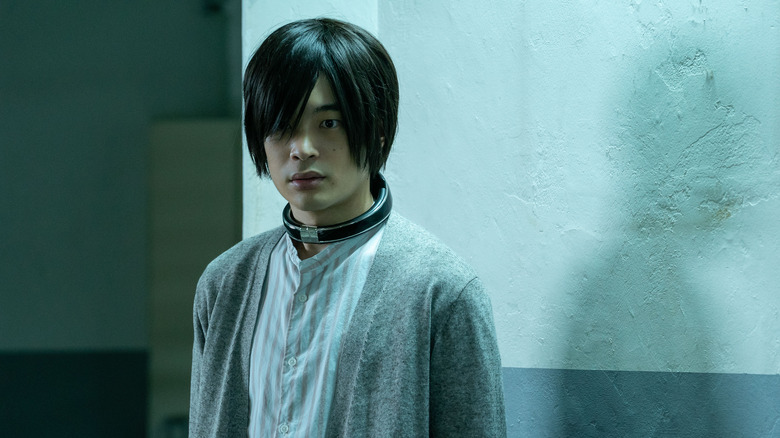This Is What Each Of The Card Suits Represents In Alice In Borderland
Most of us have played card games around a table. From five-card stud to Texas hold 'em, there are dozens of card games to keep you busy. However, Netflix has brought forward a very different type of card game to consider playing with the in-laws, thanks to "Alice in Borderland." The series follows a group of bored young people transported to a separate dimension to compete in a game of survival. Ryohei Arisu (Kento Yamazaki) is an aimless video game-obsessed man who finds himself in an abandoned version of Tokyo, competing in survival games until he meets Yuzuha Usagi (Tao Tsuchiya), who teams up with him to stay alive and unravel the mysteries of the world.
"Alice in Borderland" was released to generally positive reviews, according to its Rotten Tomatoes scores. Caroline Ademic of Hollywood Insider said in her 2020 review of Season 1, "This is far and away the best show I've watched all year. 'Alice in Borderland' deserves way more attention than it's getting. I watched it religiously until I finished it. I honestly want to rewatch it again right now; it was that good." The series has also been killing it on Netflix, causing the whole streaming world to buzz.
While the show has garnered great reviews, one element of the show — the deck of cards — is still causing a little confusion. While the players are told to win the game, they must collect an entire deck of cards; there is a deeper meaning behind them. The suits all mean something specific, and each one can determine what kind of game the player is about to play.
Spades represent physical games
The physical games in "Alice in Borderland" test the player's strength, stamina, and physical prowess. They involve combat, escape from physical dangers and obstacles, and even swimming. The venues that these games take place in are large, open arenas that resemble those of "The Hunger Games." Threats are around every corner in the arenas and there are very few places to hide. The games can be as simple and straightforward as holding onto an elevator while it rises up the shaft like the two of spades in the montage of Episode 5. They can also be as difficult as going after the King of Spades himself, as his game consists of the winner taking him out or him disposing of every other player before they can win the game.
Lisa (Chihiro Yamamoto) chooses to lead her team in the Queen of Spades game in Season 2, called Checkmate, where the two teams go face-to-face to collect as many team members as possible. Lisa is fast, capable, and hard, a physically capable example of what the Spades games and cards stand for.
Clubs require teamwork to survive
The suit of clubs focuses on teamwork and a balance between the other suits, where they can sometimes use betrayal or physical tests to confuse the player. The aim of each of these games is to build trust and cooperation between the players, and they can survive if only they can find a way to work together. The venues where the games take place are some of the largest in the series and often entail an aspect of playfulness, such as lanterns, candy, and artistic graffiti.
The games that are known involve a wide variety of focuses and goals, whereas the Four of Clubs involve the teams getting through a tunnel while surviving four different trials. They can also be as simple as the players having to scale ropes. For example, in the case of the Jack of Clubs, it is game over if a player isn't able to hold on to the rope. While there are games shown in the series for the characters to face, not all of them are being seen in the live-action, but could be seen in future seasons as the storyline develops.
Diamonds test your wit and intellect
Diamond games have little to nothing to do with physical prowess. They focus solely on the mental capacity of the player. The games test the player's logic, rationality, numbers, math, and probability. There are often times that the games are simple tabletop board games and don't involve the cooperation of others, resulting in only one winner. The venues where these games take place are often the smallest, but the grandest, such as restaurants or courtrooms.
The Four of Diamonds is the game played on the beach when it is the last number card needed for a full deck. The game consists of a lightbulb and three switches. The rules state that the players can flip a switch with the door closed and the lightbulb on the other side. A wrong switch will raise a water line, and if it gets to the exposed lines then it is considered game over. A mathematical solution allows Arisu to win the game.
Hearts are games of trust
Hearts are the most emotional of the games, as they are designed to get the players to play with the hearts of others. The games often involve betrayal and a loss of trust. These games take place in a wide variety of venues — inside and outside, large and small.
The Ten of Hearts game involves the players being tasked with finding the evil witch who took the life of Momoka and casting her in the fire of judgment. The players initially cooperate while Momoka's body lay in the corner of the room. The idealists and the militants eventually begin a conflict that results in a mass murder inside the venue. The solution of the game is that Momoka herself is the witch. Once they discover this, they throw her in the fire to win. Shuntarō Chishiya (Nijiro Murakami) then collects the card at the end of the game and is left with only the face cards to collect.
The phases of the games in "Alice in Borderland" are separated between the number cards and the face cards. At the end of Season 2, when it seems that the players have won the games and return home, they are presented with a Joker card, insinuating that there is a third phase on the way.




